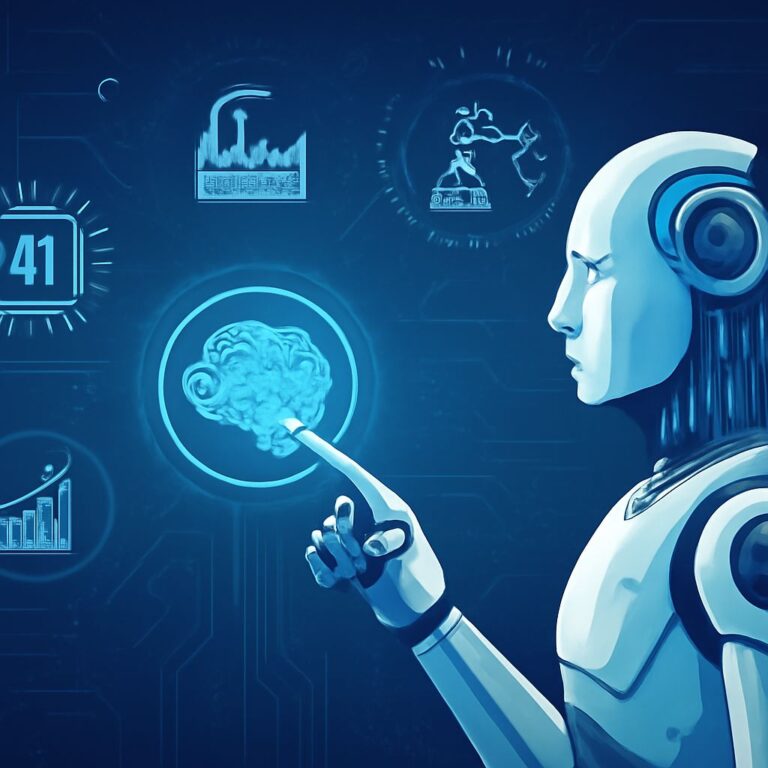Table of Contents
Introduction
The rapid advancement of artificial intelligence (AI) technology has unlocked unprecedented opportunities for modern enterprises. As businesses strive to maintain competitiveness in a fast-paced digital world, AI presents transformative solutions that can revamp operations, enhance customer experiences, and unveil novel avenues for growth. By understanding and leveraging AI technologies, businesses across various industries can position themselves at the forefront of innovation and operational excellence, ensuring they not only survive but thrive in the digital age.
AI in Business Processes
AI has proven to be a game-changer in optimizing business processes. Enterprises are increasingly relying on AI-driven data analytics to gain insights, make data-driven decisions, and streamline operations. The integration of AI can lead to significant improvements in efficiency and accuracy, especially in areas such as supply chain management, customer service, and marketing. By transforming traditional business methods, AI empowers companies to achieve unprecedented levels of performance and agility.
- Automated data processing reduces manual errors and increases productivity, allowing employees to focus on more strategic tasks.
- Predictive analytics highlights emerging market trends, enabling businesses to stay ahead of the curve and proactively meet customer demands.
- Natural language processing refines customer interactions, providing a more intuitive and seamless communication experience.
Enhancing Operational Efficiency
Operational efficiency is the backbone of successful business operations. AI technologies help in eliminating bottlenecks by automating repetitive tasks and optimizing resource allocation. Through AI-powered software, businesses can dynamically adjust operations based on real-time data, thus maximizing output while minimizing waste. This efficiency extends to various departments, including financial reporting, human resources management, and logistics.
AI-Driven Business Intelligence
Business intelligence has evolved significantly with the introduction of AI. Machine learning algorithms analyze historical data to find patterns and correlations that might not be visible to the human eye. These insights facilitate strategic planning by allowing businesses to forecast trends, align resources effectively, and make data-backed decisions.
Revolutionizing Customer Experience
AI technologies are instrumental in reshaping customer experiences across various sectors. From personalized product recommendations to intelligent virtual assistants, AI enhances engagement and satisfaction. Enterprises leveraging AI in customer service can provide 24/7 support, tailor offerings, and ensure a seamless user journey. By anticipating customer needs and tailoring interactions, businesses can cultivate stronger relationships and boost customer loyalty.
Personalization and Customer Insights
In an age where consumers are bombarded with choices, personalization is key. AI collects data on customer preferences, behaviors, and feedback to create bespoke experiences. For example, retail businesses can recommend products based on previous purchases or suggest content aligned with customer interests, leading to an enriched shopping experience.
Efficient and Responsive Customer Support
Artificial intelligence in the form of chatbots and virtual assistants revolutionizes customer support by providing instant responses and solutions. These AI tools are designed to handle common inquiries and redirect complex issues to human agents when necessary, ensuring customers always receive the help they need promptly and efficiently.
The Role of AI in Innovation
Innovation is at the heart of AI’s impact on modern enterprises. AI not only optimizes existing operations but also drives the creation of new products and services. By fostering a culture of innovation, businesses can harness AI to explore untapped markets and create unique value propositions. This capability to innovate is pivotal for companies aiming to differentiate themselves in competitive landscapes and capture emerging opportunities.
- AI-driven research leads to breakthrough product designs, resulting in cutting-edge solutions that meet the evolving needs of consumers.
- Machine learning algorithms spur rapid prototyping, allowing businesses to test and refine concepts quickly and cost-effectively.
- Real-time data analysis informs innovative business models, providing insights into customer desires and market gaps.
Fostering a Culture of Continuous Innovation
To fully leverage the transformative power of AI, enterprises should cultivate an environment that encourages exploration and the adoption of new ideas. By integrating AI tools into the creative process, businesses can uncover novel solutions that were previously unimaginable. Furthermore, AI enables increased collaboration between teams and disciplines, melding various perspectives for richer innovation.
Emerging Technologies and Future Trends
The future of AI is teeming with potential, as ongoing research continues to push the boundaries of what technology can achieve. As AI becomes more sophisticated, businesses will likely see advancements in areas such as autonomous systems, enhanced reality applications, and smarter analytics capabilities. Staying informed about these emerging technologies is crucial for enterprises that wish to remain leaders in their respective industries.
FAQ
What industries benefit most from AI solutions?
Industries such as healthcare, finance, retail, and manufacturing are experiencing significant benefits from AI due to its ability to enhance precision, efficiency, and personalization. In healthcare, AI aids in diagnostics and patient care; in finance, it improves risk management and fraud detection; and in manufacturing, AI optimizes production processes and supply chain logistics.
How does AI improve decision-making in enterprises?
AI improves decision-making by analyzing large volumes of data quickly and providing actionable insights, allowing businesses to make informed decisions and respond to opportunities or threats promptly. By leveraging AI, companies can shift from reactive to proactive strategies, ensuring better resource allocation and competitive advantage.
What are the challenges associated with implementing AI in enterprises?
While AI presents numerous benefits, its implementation may pose challenges such as high initial costs, the need for specialized skills, and data privacy concerns. Businesses must invest in training and development to build internal capabilities while also ensuring robust data governance frameworks are in place to protect sensitive information.
How can small businesses start integrating AI solutions?
Small businesses can begin their AI integration journey by identifying key areas where AI can add value, such as customer service automation or data analysis. They can leverage cost-effective, cloud-based AI platforms and collaborate with technology partners to gradually build their AI competencies, ensuring a scalable and sustainable adoption.
How does AI influence organizational culture?
AI influences organizational culture by promoting a data-driven mindset and encouraging innovation. As AI automates routine tasks, employees can focus on strategic, creative, and interpersonal activities, which can enhance job satisfaction and foster a collaborative and agile work environment. An AI-driven culture emphasizes continuous learning and adaptation to technological advancements.
As AI continues to transform the landscape of modern enterprises, its role as a catalyst for innovation, efficiency, and customer-centric approaches is highlighted. By investing in AI solutions and embracing the changes it brings, businesses can unlock new levels of success and firmly establish themselves in the future of their industries.









